As the Land Use Planning Commission (LUPC) prepares to make its decision regarding Wolfden Resources’ flawed mining proposal, more than a thousand Mainers, local businesses, Wabanaki tribes, government agencies, and conservation and philanthropic organizations have submitted written testimony opposed to the project because it’s too big of a risk for Maine.
The broad range of comments reflect the breadth and depth of statewide opposition to the mine, detailing the ecological and economic impacts of mining, personal connections to the Pickett Mountain area, personal experiences with mining, and Wolfden’s lack of experience.
During the LUPC hearings on this project, Wolfden’s CEO said he wants to put mines all across Maine, and in previous statements to investors he celebrated what he called the “lack of Indigenous rights.” The LUPC plays an important role in reviewing development projects in the North Woods and must reject the mining proposal from this untested and underfunded company so we don’t waste any more taxpayer resources.
State and Federal Park Agencies Speak Out
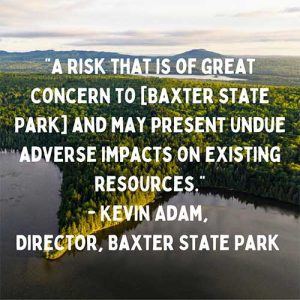 “The NPS is concerned about the location of the proposed ore processing facility and potential direct and indirect effects to NPS resources as the proposed mine site is approximately five miles northeast of the eastern boundary of the Monument. If the ore processing facility is located closer to the Monument boundary, there may be additional indirect or unforeseen impacts to the Monument.” – Mark Wimmer, National Park Service, Superintendent, Katahdin Woods & Waters National Monument
“The NPS is concerned about the location of the proposed ore processing facility and potential direct and indirect effects to NPS resources as the proposed mine site is approximately five miles northeast of the eastern boundary of the Monument. If the ore processing facility is located closer to the Monument boundary, there may be additional indirect or unforeseen impacts to the Monument.” – Mark Wimmer, National Park Service, Superintendent, Katahdin Woods & Waters National Monument
“A rezoning that would allow Wolfden’s proposed mining within this landscape, with its irreplaceable and largely protected natural treasures, represents a risk that is of great concern to BSP and may present undue adverse impacts on existing resources.” – Kevin Adam, Director, Baxter State Park
Wabanaki Tribes and Tribal Citizens Speak Out
“These waters and lands are precious resources for our tribal citizens and for all Maine people…Wolfden’s mine would be a heavy blow to our tribes’ efforts to restore and protect fisheries in northern Maine. Wolfden has also showed blatant disrespect for our tribes. Wolfden’s CEO publicly stated in an investor video that the lack of ‘Indigenous rights in the state of Maine’ is a factor that ‘really streamlines the permitting process.’ It is disrespectful and wrong to say there are no Indigenous rights in Maine.” – Chief Clarissa Sabattis, Houlton Band of Maliseet Indians and Chief Kirk Francis, Penobscot Nation
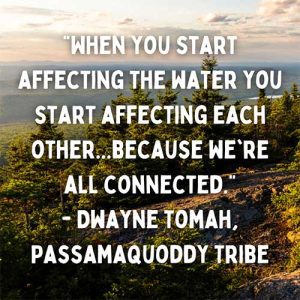 “We have inhabited this region for over 12,000 years according to archeologists. We have a deep connection to our Mother. And when I say our Mother, I’m talking about your Mother as well. She’s hurting. She’s in danger, in serious danger. Our people have been saying this for thousands of years… We have economic ventures that people are trying to take us on, and we don’t want to be part of that venture. It’s all economically based and driven by economies and money. Start taking a look at how we treat our Mother. When you start affecting the water you start affecting each other. What you do to the water you do to every one of these people here. What you do to the fish you do to everybody here. What you do to the salmon you do to everything. We’re all affected because we’re all connected.” – Dwayne Tomah, Passamaquoddy Tribe
“We have inhabited this region for over 12,000 years according to archeologists. We have a deep connection to our Mother. And when I say our Mother, I’m talking about your Mother as well. She’s hurting. She’s in danger, in serious danger. Our people have been saying this for thousands of years… We have economic ventures that people are trying to take us on, and we don’t want to be part of that venture. It’s all economically based and driven by economies and money. Start taking a look at how we treat our Mother. When you start affecting the water you start affecting each other. What you do to the water you do to every one of these people here. What you do to the fish you do to everybody here. What you do to the salmon you do to everything. We’re all affected because we’re all connected.” – Dwayne Tomah, Passamaquoddy Tribe
“As Indigenous people we are keenly familiar with the process of being misled and lied to by corporations. We are not falling for Wolfden’s glad-handing and empty promises about labor opportunities and Maine’s economy. We can see that any economic benefit of mining in Patten would be short-lived and far outweighed by the environmental consequences that would reverberate throughout the state.” – Mali Obomsawin, Old Town
“We must realize that approving this rezoning application would open the floodgates to destructive mining developers, moving into Maine wreaking havoc and destruction that would last for generations to come. I urge you to not fall for Wolfden’s deceit when they talk of how their project would benefit the state of Maine. I believe they couldn’t care less about the state of Maine and its people nor its waterways and pristine wilderness. The same way that Ron Little did not seem to care about the brutalization and devastation of children forced to work in his mine in Burkina Faso or the environmental impacts there. I don’t believe Wolfden cares about the local economy. They only care about making a quick buck, extracting the resources from Maine, and then footing Maine taxpayers with the bill cleaning up the mess that will inevitably occur due to this mine.” – Lokotah Sanborn, Indian Island, ME
“I’ve seen my people and my elders get sick from cancers and other diseases mostly caused by pollution from paper mills that I’m sure at some point or another were deemed as safe with the latest technology…Over the years Native people have seen treaties, heard promises all of which have been broken. I’ve seen the effects chemicals have done to my people, just walking through the woods and touching the trees you can see and feel the effects of logging and what industry has done. I fear for myself, for my siblings, and for every generation after.” – Ollie Valero, Piscataquis County, ME
Personal Quotes from Current and Former Area Residents
“I’ve lived and worked here nearly my entire life. It’s not always been an easy thing to do. Life is a bit tough here at times, the pay isn’t always great, and the expenses are many, but I’ve always loved it here. I love the mountains and the forest, the lakes and the streams, the endless possibility for adventure, and all the wildlife in which it contains. I’ve fought to stay here, and I’ll continue to fight for as long as I can. If this mine does get approved…It breaks my heart, but that will be it, and we will leave. I can’t stand the thought of staying and watching my home be destroyed by pollution. People applaud them because they think they’re going to get some money out of it.” – Becky Noyes, Patten, ME
“One compelling reason for the public’s support of the establishment of [Katahdin Woods & Waters National Monument] was the significant increase in outdoor recreation opportunities KWW would prompt thereby contributing to the region’s economic development. My family is proof that this vision is coming to fruition…I can say with confidence that our family would not have chosen this area in which to establish our summer roots, and therefore would not have made our contributions to the local economy, had this mine been in operation when we were searching for a long-term, outdoor-oriented setting. I know we are not alone.” – Christopher Heckscher, Mt. Chase/Hersey, ME
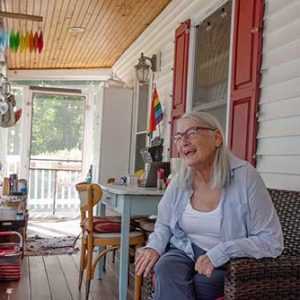
MaryAlice Mowry, photo by Nina Duggan
“This is not the company to build a mine in Maine. This is not an appropriate opportunity to test Regulation 200. This is not the project that will bring economic prosperity or enhance our local communities. These are not the natural resources that should be put at risk, and this water — this precious water—should not be destroyed.” – MaryAlice Mowry, Patten, ME
“Island Falls, on the banks of the West Branch of the Mattawamkeag River and wonderfully close to Mattawamkeag Lake, is my hometown. My husband and I raised our children, now adults, in Crystal. We have always canoed, kayaked, hiked, and boated on the local waterways, all part of the same watershed that is situated close to Pickett Mountain. To approve a mining facility in the area, with a company that hasn’t proven it can do what it says it can do, seems irresponsible, frightening, and unwise.” – Annette Stevens, Island Falls, ME
“The Katahdin region has been rebounding economically, combining recreation and tourism with the forest products industry, reenergizing our main streets, and tapping into the digital economy across the regions municipalities. The claim that this company and project will ‘save us’ is far from fact…I’m a current Maine Guide, Wilderness First Responder, and Lodge hand near this proposed project, as well as former councilor and chairman of Millinocket, also located in the region. I’ve seen the economies and landscape of the region change…for the better. This is not the time to be taking any steps back.” – Cody McEwen, former Millinocket resident
“As someone who works in Patten I feel as though Wolfden should not be allowed to go ahead with this mine. Their proposal has holes all over it. They have not stated where their tailings are going to be stored. The potential for pollution is huge. The toxic residue from the tailings could stay in these waters for centuries! Generations of harm for small, short-term profit. We should not sacrifice the health of our drinking water for the profits of some private business. Wolfden itself has admitted that the amount of local employees they will hire will be minimal. Whatever money is made from this project will not go back into the town. The waters of northern Maine are too valuable to risk with this project.” – John Stewart-Racicot
“When we arrived in Patten in the 1970s it was a bustling community, with economic stability bolstered by the Huber Plywood mill, Great Northern Paper Company, Sherman Lumber Company, Island Fall Starch Factory, a UPS Distribution Depot, and others. None of these companies are any longer extant. The population fell as job opportunities diminished, an impact that was felt in the schools, as well as Town government. The persistent asset of the Katahdin region is its natural resources. Baxter State Park has long been an attraction, but now the Katahdin Woods and Water Natural Monument offers further hope of a future built on those resources. We are starting to see the impact of an economy built on tourism. There is nothing about the Wolfden mining project that supports that future.” – Ronald Blum, Patten, ME
“I strongly oppose any new mine development permits in the North Woods because it will set a precedent that leads to more mining. I fear the long run, in which the woods and waterways I have loved since I was a boy will be permanently damaged for outside corporate profits.” – David Jenkins, Millinocket, ME
Mainers from Across the State Speak Out
“The history of mining is rife with broken promises, bankruptcies, and dissolutions, followed by ongoing efforts to mitigate the damage, footed by the taxpayer. We need look no further than the old Black Hawk mine in Blue Hill or the Callahan mine in Brooksville. I used to live down there and knew a number of people employed by those outfits. The jobs were short lived but the damage remains to this day.” – Andrew Donaldson, Round Pond, ME
“When hiking in California while there for work for several weeks, there were No Swimming signs by every natural pool and river crossing, explaining that the water was too contaminated for humans to enter. It was such a sick landscape and environment to move through and made me so grateful for the protectors of our land and water here in Maine.” – Madeleine Purcell, Buxton, ME
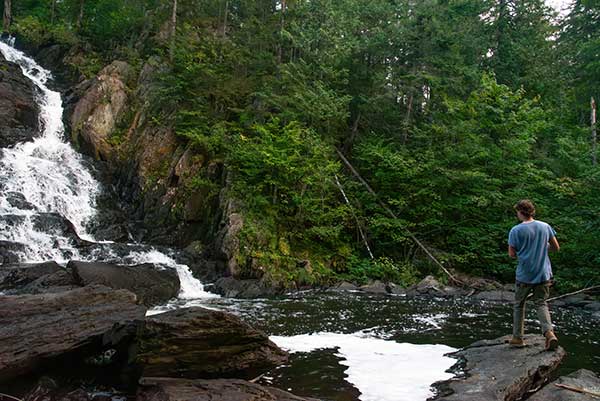
Fly fishing at Shin Brook Falls, photo by Nina Duggan
“The Katahdin region is an important area for Mainers from across the state. The resources at risk include State Heritage Fish Waters with some of the best fishing I have ever experienced. I still fish Mud Lake and Pleasant Lake, as I have been doing for decades, though I have lived in Central Maine now for many years. These waters belong to all of us, not just to Wolfden.” – Bill Bridgeo, Augusta, ME
“My wife is from Ohio, and a fracking company came there about a decade ago and made all the same promises. Their Preliminary Economic Assessment is very similar to the one Wolfden submitted for Picket Mountain. As far as I know none of their promises came true. They hired workers from Texas and Oklahoma to do the work because they were already trained. The companies’ and workers’ trucks are all registered out of state, so Ohio doesn’t see any of that money.” – Jason Barrett, Friends of Cobscook Bay
“Over my 28 years as an aquatic biologist with the Maine Department of Environmental Protection, I have seen the extraordinary cost and effort that must be expended to remediate poorly planned industrial development and operations that fail to prevent environmental impacts. Unforeseen consequences of poor decisions can be extremely costly and detrimental to the state’s economy, environment, and reputation…Even with extreme vigilance, metallic mineral mining will contaminate ground and surface waters of Maine.” – Susan P. Davies, Liberty, ME
“It is possible that Wolfden will train local people for these jobs, yes; it is also possible that they will bring in remote workers to fill them (their Preliminary Economic Assessment states they plan to use a 7-on-7-off schedule, which is one of the schedules used in the mining industry to accommodate fly-in-fly-out remote workers). What is certain is that if given the choice between doing what is right for Maine workers and doing what is right for their profit margins, they will sell Maine workers out every time.” – Emily Carpenter, East Sullivan, ME
Stories from Mainers Who Experienced the Effects of Mining First-hand
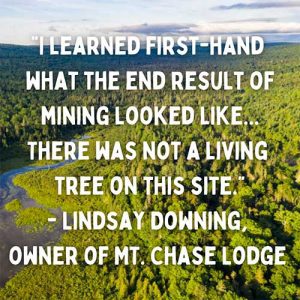
“For several years, I lived and worked on Zambia’s Copperbelt, an area that has been mined for many generations. While conducting a detailed study of perspective disparities among mining company representatives and local residents, I had many occasions to observe effects of the companies’ long‐term actions on the surrounding towns and countryside. These effects included villages with shockingly stunted vegetation; large open sludge pools; huge, deep areas scoured of everything but crushed rock; and acrid air.” – Elizabeth Parsons, Portland, ME
“I have flown to Georgia and set home to Maine on foot, with the end goal to walk all the way to my home at Mt. Chase Lodge. It was on this hike that I learned first-hand what the end result of mining looked like. Having never put a second thought toward the damages of mining, I woke up one day in July of 2011 in Palmerton, PA. The town was abandoned more or less, with one diner open to feed hungry hikers and a blinking streetlight. Again, I did not put much thought toward it, but as I hiked north, I walked through the Palmerton Zinc Superfund site. Looking down on the town and abandoned buildings left behind, along with fencing left that we had to navigate around, I’m now learning this was 30 years AFTER the mining operation. This was all left for the locals and government to clean up. There was not a living tree on this site. It was a completely bald mountain.” – Lindsay Downing, owner of Mt. Chase Lodge
Conservation and Philanthropic Organizations Speak Out
“Wolfden’s proposed mine is a threat to our businesses and Maine’s natural resources, and allowing mining near Mt. Chase would be incompatible with existing uses of the area. Because we depend on healthy habitat, abundant fish and wildlife populations, and access to wild areas, we are deeply concerned about the potential impacts Wolfden’s proposed mine would have. We are concerned that the project could cause significant ecological harm to the forests and waterways that our members use for guiding. The proposed mine would degrade water quality and the scenic beauty of places we have taken clients to recreate and fish for many years.” – Reid Anderson, President, Maine Wilderness Guides Organization
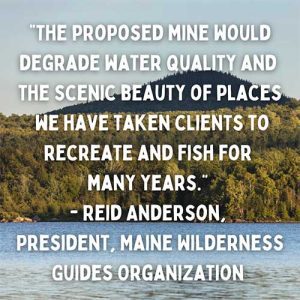
“The Katahdin region and the shadow of a national monument is no place to operate a metallic mineral mine.” – Brian Hinrichs, Executive Director, Friends of Katahdin Woods & Waters
“Pickett Mountain is located in the Mattawamkeag River watershed, the largest eastern tributary of the Penobscot River. Baxter State Park is also within the Penobscot watershed. The Mattawamkeag has the highest water quality classification for a river in Maine. Tribes in Maine depend on these source waters to support significant bird and fisheries habitat. From past experiences of mining operations, we have not seen enough evidence that there are proven, cost-effective technologies to avoid surface and groundwater pollution.” – Friends of Baxter State Park
“The Maine Geological Survey specifically asked Wolfden to provide an example of a mine that treats wastewater to levels as clean as natural background, but none was provided in the application. TNC remains skeptical that this type of development is possible with current technology and the financial resources available.” – Kaitlyn Nuzzo, Director of Government Relations, The Nature Conservancy in Maine
“According to the 2015 World Atlas of Night Sky Brightness, the Northern Maine Woods region is one of the last remnants of natural darkness in the eastern United States of America. To place this in context, more than 99% of people in the United States live under light-polluted skies. Scientists estimate that light pollution in North America is growing at 10.6% per year…Rezoning the property threatens the extraordinary natural darkness of this special place, with impacts on the region’s flora, fauna, and economy. The introduction of any artificial lighting into this environment would have deleterious effects, and an industrial mine covering hundreds of acres would be devastating.” – Ruskin Hartley, Executive Director, DarkSky International
“Regarding brook trout, Wolfden asked for information from the Maine Department of Inland Fisheries & Wildlife, who replied that ‘regional fisheries staff consider Pleasant Lake to be some of the best brook trout and landlocked salmon waters available in the region’, citing ‘extraordinary growth’ of brook trout, and dissolved oxygen levels that ‘remain ideal from top to bottom.’ Pleasant Lake and Mud Lake, as well as Grass Pond downstream from them are all designated as Maine State Heritage Waters for native brook trout. Wolfden’s application carefully removes ‘best brook trout and landlocked salmon waters available’ from their description of fisheries resources, and citing reports from more than 60 years ago, repeatedly describes these excellent fisheries as ‘shallow,’ ‘mud bottom,’ ‘warm,’ and not ‘supportive of cold-water fisheries.’” – Jeff Reardon, Project Manager, Atlantic Salmon Federation
“Wolfden has never operated a metallic mine anywhere in the world. As indicated during the technical sessions, their staff only have experience managing mines in dry, arid conditions outside of the US. They have zero experience operating a mine in a wet state like Maine or managing and treating wastewater at the size and scale required. As Maine continues to adapt to a changing climate, we will continue to see more frequent and intense rainstorms, snowstorms, and flooding events, increasing the risk of polluting local waters.” – Todd Martin, Northeast Senior Program Manager, National Parks Conservation Association
“The Katahdin region is an area known for its scenic beauty, recreational opportunities, and forestry operations. It is one of the last vast wilderness areas left in the country. It is home to the 6th largest state park in the country and a National Monument, as well as being of significant cultural and spiritual significance to our Indigenous citizens. The Katahdin region is no place for a mine!” – Robert Guerette, President, Island Falls Lakes Association










Concerning LD1363: I would like to know the final changes that were made in the ammendment to LD1363, the Maine Metallic Mining Bill as signed by the governor.
Thank you
Hi Larry. Here is the link to the final language that was signed into law earlier this year: https://www.mainelegislature.org/legis/bills/getPDF.asp?paper=HP0877&item=7&snum=131
Please, please continue to resist the money-mongers, who only want to exploit our lands, without any consideration for the planet or future generations. We’ll continue to support NRCM to preserve and protect Maine’s exceptional wilderness and the vision for protecting it.